How To Start Commercial Pig Farming Business [Complete Guide]

This comprehensive guide for beginners will walk you through the process of setting up and running a commercial pig farming business today.
You will learn about the cost of starting a pig farm, when to start, and where to situate your piggery.
Also, you will learn about pig housing, and find some useful tips for buying your first set of pig boars and sows.
You will also learn about the pig breeds that are the best for your location and the purpose for which you are keeping them.
Now, let’s delve right into the details.

Why should I start a pig farming business?
If you have read till this point, I must commend you for choosing to go into pig farming. I truly admire your passion to learn and make a living from this very lucrative agribusiness idea.
There are tons of benefits associated with commercial pig farming. I have outlined some benefits of going into the piggery business below.
These benefits should give you a reason to start your own piggery today.
- Pigs have the advantage of being prolific breeders.
- They have a faster growth rate.
- Pig Farming is very Lucrative.
- The animal has a high food conversion ratio.
- Setup cost and management of commercial pig farming business are easy.
- Pig meat (pork) is in high demand especially in Nigeria and in Foreign markets.
- Starting a Pig Farming Business in creates employment opportunities for many
- There are a lot of products that use pig body parts as raw materials.
- Pig dung from pig farms is used as manure.
Read Also: Benefits of commercial Pig Farming Business
Who can start a pig farming business?
- Pig farming is a good business for anyone who wants to may a huge profit from agriculture.
- It is also an awesome agribusiness for you if you are looking for a part-time business that will generate additional income for you.
- Even though you are uneducated and unemployed, you can still make lots of money from pig farming with the right training.
- Starting a piggery is great if you are a small-scale farmer looking to add some livestock to the farm.
- Guess what… even women in the agriculture sector can try this business too.
Pig products you can focus on in commercial pig farming Business
Pig has a wide variety of uses and is highly demanded as meat for human consumption and as raw material for many industries.
Most people use pork as a common ingredient in making many kinds of sausages.
Ham and bacon are also popular products that are made from fresh pork. Bacon is prepared using salted and/or smoked pork taken from the sides of pigs while the shoulders and legs of pigs are most commonly prepared as ham.
Other useful products which you can focus on producing in commercial pig farming include:
- Pigskin: Do also know that Pigskin is a good specimen for practicing tattoo art? The skin is also used for simulating human flesh when testing bullets. Other products such as low-fat butter, x-ray films, drug capsule, safety gloves and even chewing gum are produced using pig skin.
- Internal organs: The internal organs of pigs are used for making pet food, tambourine skin & football (bladder), surgical anticoagulant (stomach mucus), heart valves (surgery), as well as insulin (pancreas).
- Pig bones: Pig bones are used for making fabric softeners, match heads, train brakes, yogurt, beer, wine corks, ice cream, inkjet paper, and stabilizing the propellant in bullet making.
- Oil fat from pigs: Pigs have the highest fat content bodily and this fat is used in the production of soaps, crayons, shampoos, and biodiesel.
- Blood meal from pigs: This is used in making fish foods, aluminum ingot moulds cigarette filters, and toothpaste.
- Bristles and ears: The bristle and ears of pigs are used to make paintbrushes and they are also used for testing chemical weapons.
You may also like to read this article to find out What do Pigs Eat? [Most Essential Food for Pigs].
Commercial pig farming products – Infographics
Costs of starting a commercial pig farming business.
To efficiently run a profitable big farm, you must take care of the following cost centers:
- Buying or leasing of Land
- Cost of building a storage room where pig feed can be mixed and stored. Equipment can also be stored there.
- Depending on the location of the farmer, the cost of building a room for yourself and your workers may be incurred
- Pig housing construction
- Cost of installing water facilities including pumps, pipes, taps, drinking nipples, reservoirs and boreholes if needed.
- Expenses on Self-feeders
- Feed scale
- Cost of Fencing and gate
- Money put into Road construction.
- Purchase of personal Trucks for transportation of pigs and feed.
- Beginning stock of gilts (young female pig) and boars (young male pig) which are 8 -10 months old for pig breeding business.
- Beginning stock of piglets for growing-out farmers, the same thing as ‘fattening.’
Other costs involved in pig farming:
- Cost of Labour
- Transportation cost
- Fuel cost
- Veterinary Bills
- Medication
- Slaughter fees
- Repairs and maintenance of fences, buildings, and vehicles
- Additional animals.
Read about Duroc Pig Breed – All You Need to Know: Origin and Characteristics

How to start a commercial pig farming business
Every pig farmer out there has his/her own success strategy. But, the first thing you must know to be a successful pig farmer, is to have basic ideas about pigs and how they are managed.
Other things you need to know before starting out your pig farm include
- How to Select high-quality pig breeds.
- What should a good pig farming site look like?
- How to Build a very well secured and safe shelter for your pigs
- What are the methods of planning and scheduling Pig feeding?
- How to manage pig breeding
- Health and Disease of pigs and how to manage them.
Another success tip is the use of a well-prepared pig-rearing business plan. It will be a good guide to running a profitable pig farming business.
A well-detailed commercial pig farming business plan should include all the financial details of purchasing pig breeds, management costs, and marketing costs.
How to choose a perfect location for running a commercial pig farm
- The site should not be located in swampy areas that can be easily flooded by rainwater.
- Your pig farm site should have enough protection from direct sunlight and should provide ample fresh air.
- The farm should be located away from residential areas because of bad odor.
- If you are running a large-scale pig farm, your pig farm site should have good accessibility by roads.
- Your piggery must have provisions for the proper disposal of manure from the pig farm.
- A perfect location for pig farming should be connected to reliable water and electricity sources.
- Build your pig farm in a location where you can easily have access to veterinary aid.
- Man labor will be required for large-scale pig farms. So, Locate your farm where you have access to enough laborers.
- Locate your farm close to your target market so that you will not spend more on transport.
Check out the Yorkshire Pig Characteristics, Origin, Breed Info, and Lifespan

What are the features of a pig house?
After the selection of suitable land for your pig farming business, the next thing is to build a pig pen or pigsty.
Here are some features that should be present
1. The pig house should be well-spaced and aerated.
A well-spaced pen is vital if you don’t want your pigs to injure themselves. Besides that, giving your pigs enough space in the pen is necessary to keep the pigs healthy.
It also minimizes the spread of diseases and other contamination to the entire farm.
You can build separate pens for boar, farrowing, dry sow, and weaner if you have the resources. This is highly recommended for a successful pig farming business.
2. Pigs are best kept in pens that have a proper drainage system.
You need to build your pig house in such a way that you can easily drain out dirt used on the farm.
If you have stagnant water in the pen, it will attract insects and other harmful pests that may harm your pigs.
3. Build a pool in your pen where your pigs can swim.
Pigs lack sweat pores in their skin. So, the only way they can cool themselves down is to swim in cold water.
By providing a pool in the pen, you have not only provided them with an opportunity to cool their temperature, but you have also provided them with a place to wash when they become too dirty.
Make sure to change the water always. Refill the pool as frequently as possible to keep the water clean all the time.
If you are keeping them outdoors, a strong shelter should be built for them to shade themselves from rain and sun heat.
Read also, Kunekune Pig: Characteristics, Origin, Breed Info and Lifespan.

4. Put all equipment for raising pigs in place before bringing your pigs.
Don’t try to bring your pigs to the farm until you have fully prepared their pen. Make sure the feeders and drinkers have been fully fitted and every specification for a good pig house has been met.
Construct a shelter that can protect pigs from adverse climatic conditions, prevent diseases, control parasites and protect them from external predators.
5. Make provisions to keep your pigs warm in cold seasons.
If you stay in a cold area, cover the floor of the pen with straw or paddy husk to keep the pigs warm.
A heat lamp can be installed in the pig house to provide heat in extremely cold seasons.
6. Use the ideal pigsty dimensions to construct your pig pen.
An ideal pig pen should be 3 x 3 meters in floor size while the sidewalls should be raised 4 – 5 feet high from the ground.
7. Provide shade for the pigs.
Pigs can easily become overheated when exposed to prolonged sunshine. As stated earlier, they lack sweat pores.
You must provide shelter to keep them away from the extremely hot sun. Also, do not forget to provide a small pool of water I mentioned earlier.
8. Use strong materials to build your pig house.
This is really important because pigs can grow very big and heavy. If you use low-quality materials, they may push them down while playing in the pen.
Ensure you use strong materials and always check your structures to ensure they are strong.
9. Disinfect the pens and invest in the prevention of diseases in your pig farm
Finally, disinfect the pens before introducing the pigs into them, especially when keeping the pregnant pigs.
Put strict measures on the farm to disease control diseases as much as possible. You may need safety boots, gloves, a nose mask, etc.
Invest in building proper pig housing that offers comfort to the pigs and allows for the efficient running of daily cleaning routines.
Check out this farming about How to start a goat farming business.
How to buy your first pig for the commercial pig farming business
Now you are ready to stock your farm with pigs that will yield a profit for you.
Just before you do that, here are some tips that will help you select the right pigs for your farm.
1. You have to decide whether you will breed pigs and sell, them or buy young pigs (weaners) to grow out and sell. I advise you to start with weaners, grow them out and sell them a few times before attempting to breed pigs.
This will give you experience and an indication of costs. You will also get to understand pigs better and be better able to develop management protocols.
2. You must ensure that the pig you are bringing to your farm is in perfect and healthy condition.
3. Buy only from trusted sources and make sure the ones you are buying have a good vaccination history.
4. Take someone with experience and knowledge in this field with you when buying pigs for the first time.
If you have access to one, a veterinary doctor is a good person to go with when getting your stocking pigs.
It is better to pay more for a good pig than less for a pig that might die very soon or one that will not perform well. Examine the pig carefully to ensure you’re purchasing a good quality animal.
Ask the seller a lot of questions to help verify the condition of the pig.
If you don’t know the right questions to ask when purchasing your stocking pigs, use these below as a guide:
What are the questions to ask when buying your stocking pigs?
- How old is the pig?
- Has it ever been sick?
- Is it receiving any vaccinations or has it received any vaccinations in the past? If yes, for which disease(s)?
- Has it received any treatment for parasites?
- For an adult pig, ask if it has bred before.
- Is there a reason why the seller is selling the pig?

Credit: Ø-Vet Health Supervision
What are the things to observe when buying your stocking pigs?
1. Observe the pig when it is lying down
- Does the pig look comfortable and relaxed?
- Is it breathing normally and regularly? Make sure the pig is not wheezing or gasping for air. Observe the belly of the pig to see if it contracts when it breathes. If it contracts, it means that the pig is battling to breathe. Only the chest of a normal-breathing pig should be rising and falling.
- Observe the pigs’ reactions when you clap your hands, shout or whistle loudly. A healthy pig should react by looking at you when you make a sudden noise.
2. Study each stocking pig when it is standing up
- Observe the size to know if it is too fat or too thin. If the hips, shoulders, ribs, or backbone under the skin protrudes out of the body of the pig, it means that the pig is too thin. If it has rolls of excess fat around its neck, it means that it’s too fat.
- An excessively fat pig can develop leg and foot problems as well as the possibility of not breeding well.
3. Analyze the overall appearance of the pig
- Is the back straight?
- Does it have a glossy coat?
- Is the pig’s skin healthy and clean?
- Does the pig have any swellings or red sores on the head, body, or limbs?
- Are their legs strong and straight?
- Does the pig walk normally?
4. Look out for these pig health symptoms
- Is the pig coughing?
- Sneezing
- Itching – This can be seen if the animal rubs against objects for prolonged periods of time.
- Diarrhea – You will know this if you see soft or watery pig dung in the pig pen.
- Constipation – The pig is suffering from constipation if you see small, dry, and hard droppings.
5. If you want to go into breeding pigs, check out these
- The litter size of pigs.
- Strength and activeness of the litter
- Observe the milking ability of pigs
- Note the temperament of pigs
You can start your pig business with as many pigs as you want to start.
However, I discourage you from starting with too many if you are just starting.
It is better to start with a small number and increase gradually because you will learn more as you progress.
Also, the risk of something going wrong when you are operating on a small scale is minimal.
A Veterinary Doctor is very important for the success of your pig farm.
You need the services of a veterinary doctor on standby, one who can visit your pig farm at short notice for regular checkups and vaccination as well as feeding and nutrition advice.
Best Pig Breeds Suitable for commercial pig farming purposes
There are several pig breeds suitable for commercial pig farming purposes and they are
- Large white pig
- Duroc pig
- Landrace pig
- Pietrain pig
- Yorkshire pig
- Hampshire pig
- Tamworth Pig
- Meishan pig
- Berkshire Pig
- Poland China Pig
There are many other species of pig breeds for commercial purposes.
However, the best pig breeds for commercial pig farming are Large White, Yorkshire, Hampshire, and Landrace.
The Large white pigs are very active and can adapt to most climates and this type of pig has a long, productive life in the breeding pen.
The pig is a highly prolific breeder and it utilizes feed efficiently. It also possesses a good carcass quality used to produce good quality bacon and pork.
The large white pig breed has also gained popularity for its ability to cross with and improve other pig breeds.
A mature boar (male) weighs between 300 kg and 450kg while a mature sow (female) weighs between 250 kg and 350 kg.
Feed management in commercial pig farming
- Feeding takes about 70% of pig production cost, just as in every other livestock farming.
- Pigs are omnivores just as human beings are. This means that pigs can consume both plants and animals.
- Like human beings, pigs need to be put on a balanced diet including all six classes of food. The better the quality of food you feed your pigs, the faster they gain weight. Generally, high-quality feed accounts for quick weight gain in commercial pig farming.
- It is better to stick to one feeding schedule for all the animals in the pig house.
- Make sure your feed is not contaminated in any way.
- All feed supply should come along with fresh and clean water. Older pigs will consume about three to five gallons of water per day.
- Add antibiotics at a ratio of 10 mg/kg to pig feed/fodder with the instruction of a veterinary professional. This will enhance the immune system of the pigs and prevent diseases from affecting them.
- If you have extra space on your farm, you can grow some crops that you can feed your pigs. Pig feeds are expensive in the market and this will make you incur some extra expenses. You can grow grain crops like maize, sorghum, wheat, oats, and millet to support your pig feeds. These savings on feed costs will directly reflect in your pig farming profits.
- Apart from regular feed, supplemental feeds like fishmeal, oil cakes, mineral mixtures, and salt cubes can be added to a regular pig diet.
- Generally, feed intake in the commercial pig farming business is based on the age and the individual weight of pigs.
Feed requirement in commercial pig farming business
The table below shows the estimated quantity of feed consumed daily by pigs in a commercial pig farming business.
| S/N | The weight of the pig in Kilograms – (kg) | Feed consumption/pig/day – (kg) |
| 1 | 25kg | 2 – 2.5kg |
| 2 | 50kg | 3.25 – 3.5kg |
| 3 | 100kg | 5.3 – 5.5kg |
| 4. | 150kg | 6.8 – 7.2kg |
| 5. | 200kg | 7.5 – 8.0kg |
| 6 | 250kg | 8.3 – 8.6kg |
(Source: India Agrifarming)
Breeding management in commercial pig rearing business
- Pigs have a short gestation period and can breed at least two times a year. The pregnancy period (gestation period) for pigs is 3 months 3 weeks and 3 days (114 days).
- Even though pigs have a short gestation period, they produce very large litters reaching up to 12 – 15 piglets in a single birth. This is exactly what makes the breeding of pigs a very lucrative agribusiness.
- You must learn how to detect heat in breeding pigs. Ideally, breeding occurs during a time called ‘standing heat’ during which time the female will ‘lock up’, meaning that she will exhibit a natural behavior of standing rigidly and be receptive to mounting a boar. You must also know how to induce heat in sows. Read more about heat detection in pigs here.
- It is extremely important to select a good boar since it contributes to half the quality of the herd.
- A breeding boar should come from a good mother. By implication, a sow gives birth to over 10 piglets per litter or more.
- You only need a few males to mate with many females in your piggery.
- A pig is ready to start breeding when it is 8 – 10 months old. Breeding males (Boars) should be at least 8 months old. A boar that is 10 months old is able to breed with about 12 females.
- If you want to service a larger number of females, use older males to do the job. A single boar that is at least a year old can mate with as many as 50 females housed in pig stalls, or 40 located in a pasture.
How to take care of the pigs during breeding
- During the breeding period, ensure that your pigs are placed on a good nutritional diet. Good nutrition replenishes their lost energy and prevents fat deposition that may lower reproductivity. Good nutrition is important to revitalize them and prevent the pig from becoming fat, especially the sow.
- Take good care of pregnant pigs until they give birth.
- When the piglets are born, take good care of them also. It is very important that every piglet sucks the sow’s breast milk the same day they are born. If you have some weak animals in the litter, help bring them to the sow’s breast so that they can suck. The first milk is very important for them to build some immunity against diseases.
- Do not forget to vaccinate the young pigs and maintain a vaccination schedule too.
- Remove the needle teeth of pigs as soon as they start developing before it becomes too hard. See a video of how to cut pig teeth here.
- Select the pigs you want to use for breeding in the future and keep them in a different pig house. Castrate the ones you want to fatten as they are still very young when they can absorb the pain and heal fast.
The bottom line is for you to plan a breeding program that will match your resources.
Don’t overshoot your budget so that you will not lose money in the end.
Reasons why your pigs may not conceive
If your pigs are not breeding well or producing plenty of piglets in a litter, it could be because of these;
- Poor breeding management leads to poor conception ability.
- If the sow has too much fat, it will also lead to low conception in pigs.
- A pig that is just experiencing its first heat cycle may have a low conception.
- If you use a boar that’s too young, it will release premature sperm that will lead to poor conception in your pig farm.
- Using a single boar to breed more than 5 times a week gets the boar overworked and unable to properly mate with other sows.
- In the case where the boar is bigger than the sow, the weight of the boar will be on the young sow.
Management and Vaccination in Commercial Pig Farming
- In any livestock farming, care should be taken throughout their growth period to prevent any unhealthy conditions and diseases.
- Newborn piglets should be vaccinated against Swine fever at the age of 60 days.
- Deworm your pigs regularly to prevent them from having a worm infection which can cause a drastic loss in weight.
- Skin infections are also very common in pigs. For treatment, contact the local veterinary facility.
- In case of any disease, The pen and shelter should be thoroughly cleaned out and washed.
- As your pigs continue to increase, you will need more hands-on your pig farm to help you will all the pig management process.
Some common diseases of pigs.
The following are some of the diseases that affect pigs.
- Tetanus.
- Bacterial infection
- Swine influenza.
- Diarrhea.
- Seizures.
- Dry, flaky, and itchy skin.
- Pneumonia.
- Constipation.
- Infectious arthritis.
- Salmonella Infections
There are many other diseases that can affect pigs, these are just the common ones.
Always invite a veterinary doctor to your farm to diagnose and make prescriptions for the pigs.
How to sell your pigs very fast for profit
The first step to massive sales in pig farming is to know your market. This is part of what is contained in the commercial pig farming business plan.
You must ask yourself this very important question before you start pig farming:
“What is the level of demand for pork in my area?
Ask yourself this even before you buy your first stocking pig because there are people with religious and cultural beliefs who are against eating pork.
The answer to the question will help you decide on the species of pigs you want to sell and the consumer group you are going to focus on.
Once your pigs have reached marketable weight, you can sell them to abattoirs or slaughterhouses and wholesale livestock dealers.
If you have the resources, you can process the pigs and sell them to the international market as well. There are factories that need pigs for different products, you can become a supplier to them.
The marketing opportunity is endless.
Commercial pig farming does not require too much marketing as pork has excellent demand globally.
Conclusion
Pig farming is a very lucrative business, but to succeed, you need proper guidance.
Make sure you seek the mentorship of expert pig farmers near you to be well-guided on this venture.
Do you have any questions about pig farming?
If yes, then tell us in the comment section below.
Also, if you want to contribute to making this topic better, please leave a comment as well.
Please, share this article now because you may be helping someone start their own pig farming business.
- What do Pigs Eat? [Most Essential Food for Pigs]
- Tamworth Pig breed- Characteristics, Origin, Breed info and Lifespan
- How to start goat farming business
- 3 Cheap and Easy Goat Housing Construction Styles
- Different Types of Pig Breeds for Pig Farming Business
- Benefits of Starting a Commercial Pig Farming Business
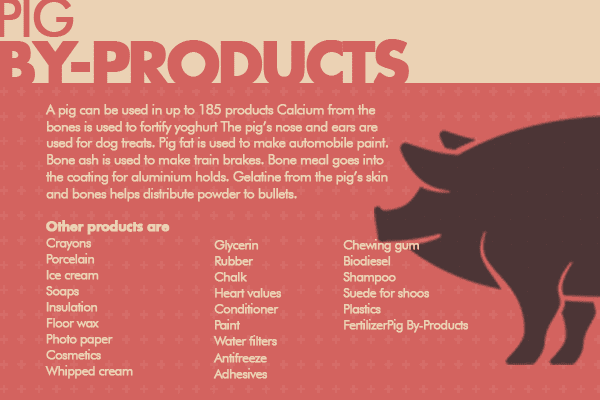
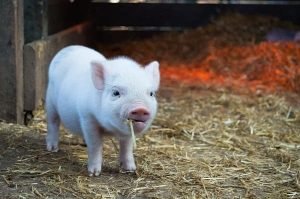
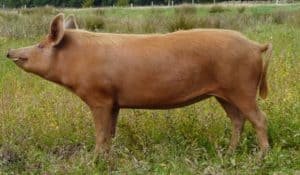
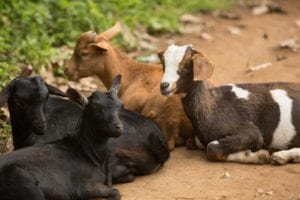
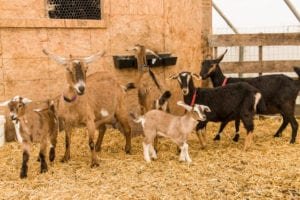

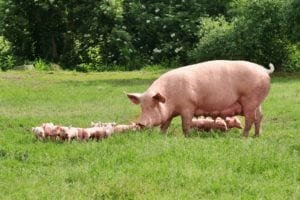
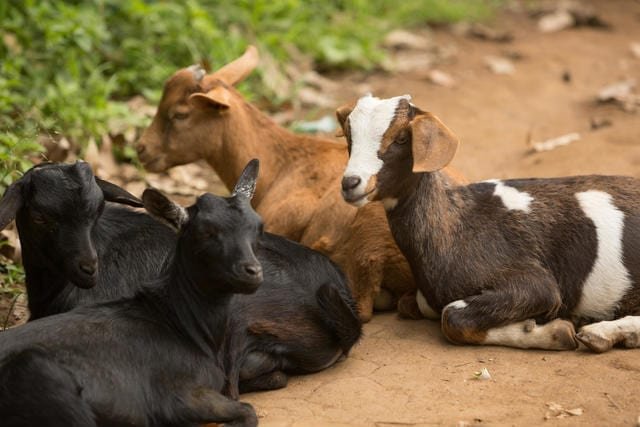
![What Food do Rabbits Eat? [List of Healthy Foods for Rabbits]](https://agro4africa.com/wp-content/uploads/2020/10/what-do-rabbits-it.-Can-rabbits-eat-cabbage.jpg)
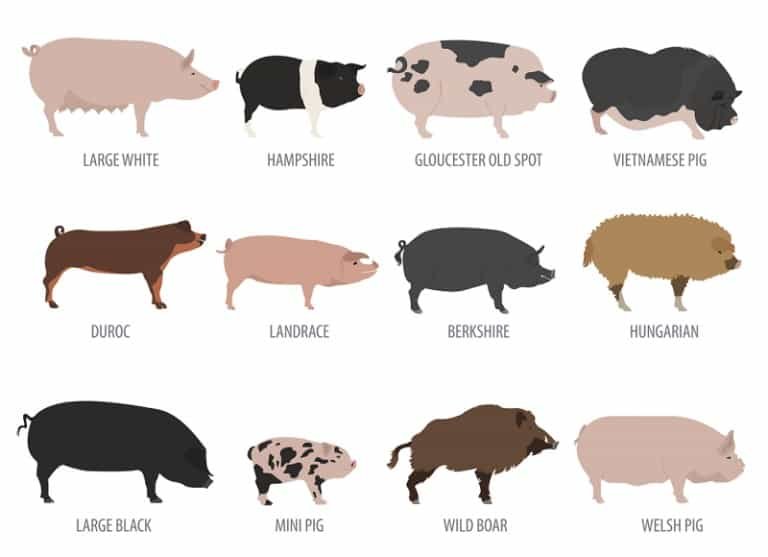


![What do Pigs Eat? [Most Essential Food for Pigs]](https://agro4africa.com/wp-content/uploads/2022/03/white-piglet-eating-food-e1648548623614.jpg)
Oh what a wonderful opportunity you have given me,i feel like starting this pig farm business right away, but i will take my time for the cash involved. Thank you so much for this tips.
You are welcome. I wish you goodluck in your pursuit to become a successful pig farmer.
Yes l Lean alot from this Post, well done
Thanks for your wonderful feedback.
Excellent, though I once managed a pig farm for a friend in diaspora, which has now relocated back home because of the lucrative in the business. I quite agree with all what I read here and learnt more as well. The education was step by step and in perfect other. My advice to others is to go into pig business, though it time, money and energy consumption at the beginning but if well managed, it’s like crude oil business.
Fantastic!! Thanks for your contribution, Hydee.
Thanks for lecturing us.
I love it ,how I wish I have money to start mine this month.
Don’t rush, you can do other things to raise money and then start when you are ready.
I’m in Uganda, thanks alot for the lesson it’s wonderful. I want to start commercial pig farming.
Great. I hope the tips helped.
i have never read a well articulated article like this before for free. thank you so much. God bless you immensely.
I’m glad you found this article helpful.
Thanks for your encouragement
You’re welcome.
Hello — Can you please advice, can we also keep both male and female for weaners ?
Sure, you can. It depends on what you want to achieve.
AWESOME! WHAT A NICE PIECE. THANK YOU AND GOD BLESS YOU
You’re welcome.
Thanks Chibuzor for this article. It is elaborate and very educative. What are the prospects of setting up a commercial pigs farm in Aba Abia State?
Remain blessed.
Chidi
You have to analyse the market to know its viability.
Very interesting session, I need to get more of your guidance and direction. Superb!
Awesome, stay tuned for more.
I have never seen a well arranged and informative article like this yhooo 💯 you are amazing my brother. My God bless you.
Thank you Ngobese for your kind words. I’m glad you find this pig farming guide valuable.
This is very educative. Please, keep it-up . It will help a lot of young farmers.
Thank you, Alice.
Wow! good guide it is.kindly email me a business plan for pigery if you can that is I need one
I don’t have one at the moment but you can pay a consultant to make one for you.
Roses are red, violets are blue. Pigs are the third smartest mammal, that makes them way smarter then YOU
Lol… funny.
This is a good piece. Thanks
You’re welcome.
I am just starting pig farming. i need guidance in piggery. kindly, provide me medication pigs from start to fish and cleaning chemicals for the pen.
regards
Nicholas
I have my land in bauchi Nigeria how do I get loan to go in to pig farming please thanks Godwin
You can apply through the Bank of Industries.
Why is it needful to cut the needle teeth of the piglets
If you allow the teeth to grow, they can use it to injure themselves in the pen. Also, it will cause a huge injury to the sow or mother pig when the piglets are sucking.
Great guide Mbazu but please be as inclusive as possible so we cannot hassitate from reading your articles…From Southern Africa in Eswatini here
I will try my best to be more inclusive. Thanks for the heads up. Glad to have you here.
Thank you for making this information available for beginner pig farmers like me. I appreciate you.
You’re welcome, Jacob.
I just love everything here, this is real extension. Well done bro.
Thank you very much, James.
Hi, thanks a lot for taking out the time to share this info, pls is there a platform where someone can engage you besides here? Facebook/twitter etc If there’s any pls share, God bless you!
Subscribe to my YouTube channel https://bit.ly/35xQmfX
Facebook: web.facebook.com/Agro4africa
What an informative publication. I’m surely going to share with my farmer partners in Western Uganda with whom we are planning to expand our business.
Awesome.
this is very good information worth sharing with prospective farmers. i am a prospective farmer and this gives me alot of guidance on how to begin. in Uganda i have only heard about Land race, Large white, cambrough being promoted. i have not heard yorkshire and Hampshire breeds.
Hey Kapuru, thanks for your compliment.
Actually, there are several breeds of pigs.
You can find some of them in this article http://agro4africa.com/pig-breeds/
thanks sir this is very interesting
I will like to learn from an expert am a young pig farmer in Abuja
Learning from an expert in your location is a good way to start.
You can ask pig sellers for contacts to pig farmers near you.
Very informative. Especially about vaccinations ..and heat behaviour..for farmers already on this platform. can somehow perhaps share with me a business plan for a loan. I basically have most of everything. Just need capital to do a proper adjustment
Has the book mentioned above been published?
If so can you please provide a link to get this?
Pig farming ebook has not been published yet.
The book will be available on our website when it is published.
good stuff.
thanks
Thank you very much Ivan.
Very educative and easy to read. Thanks
Thanks for your compliments Adedoyin. I’m glad you enjoyed reading this article.😍💝
Very useful material. I will share with farmers in my rural town in central Kenya
Thank you very much James. I will be glad to have your Kenyan friends visit my blog. <3
I have learnt a lot about Pig farming. Do you have a book on how to start a Pig Farm?
Thanks
We are currently working on a detailed book that will take you through the step by step process of starting and running a pig farm. It will be the most precious pig farming guide you’ve ever read.
Thanks for your compliment.